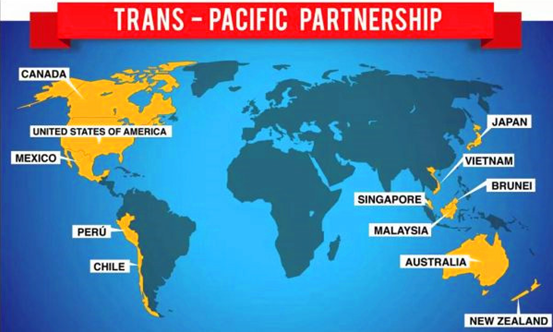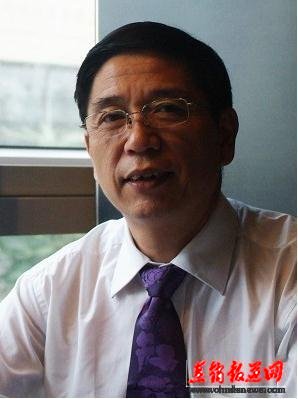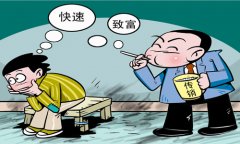2015-10-13 15:18
Ouyang wenzhang: TPP for the development of China's direct selling industry is an opportunity

(Ouyang Wenzhang / author) in October 5th, the trans Pacific Partnership Agreement (TPP) 12 negotiations in the United States, Georgia, held a ministerial meeting in the United States to reach a basic agreement, agreed to free trade, and in the investment and intellectual property and other broad areas of uniform standards. A huge economic circle of 4 of the world's size will come into being. TPP the development of China's direct selling industry in the end is the impact or opportunity, which is the focus of this paper.
What is TPP? How big is it?
Partnership Agreement Trans-Pacific (TPP), also known as the "economic nato". It is a group of New Zealand, Singapore, Chile, and Brunei, which was launched in 2002, and was originally called the Asia Pacific Free Trade Zone to promote trade liberalization in the Asia Pacific region. But as the members of the negotiations gradually increased, the United States announced in February 2008 to join, has developed to 12 member states, and ultimately to a large extent interpreted as a U.S. - led world trade rules of the United States, is the meaning of the new area of WTO trade rules.
TPP is indeed a very big challenge, but also be placed greater expectations, is considered to be "high standards, comprehensive" free trade agreement in twenty-first Century. In the past, most of the free trade area agreement is mainly limited to lower tariffs on goods, promote trade in services, rarely involved in labor and environmental protection. And TPP will not only provisions cancel or reduce tariffs on goods and will also cover safety standards, competition policy, technical barriers to trade, food safety, intellectual property, government procurement and green growth and labor protection, high standards and coverage area of Guangyuan super FTA agreements in general. Now it seems that the TPP has become a new tool for the United States to re shape the Asia Pacific Economic and trade pattern, and strengthen economic control. It will change the existing economic and trade pattern in the Asia Pacific region, and will have a profound impact on the global economic and trade relations and regional economic cooperation in the post crisis era, and will impact on other forms of multilateral trading system in the region.

China's accession to the TPP in the end difficult where?
First, currency convertibility. This is almost for China, the internationalization of China's RMB just started, if China is now free currency exchange, will inevitably lead to China's economic turmoil, a large number of capital outflows. This will be China's exclusion.
Secondly, the privatization of state-owned enterprises. This article is also aimed at China, deliberately to exclude china. Over the past ten years, China's state-owned enterprises have not only not weakened, but more and more, the country entered the people back, more and more monopoly. To join the TPP, privatization of, which for the distribution of wealth in the vested interests of the state-owned enterprises, almost prohibitively difficult.
Moreover, China's accession to the TPP agreement of the other obstacles are not small, environmental protection, labor rights, intellectual property, etc., are high standards. Among them, the environmental protection is the green barriers in trade protection. TPP advocates in biological and trade variety, multilateral environmental conventions, environmental protection divergence field, marine fishing hand raised high standard requirements, by 2015, China's new environmental law implementation, known as "the history of the most severe environmental law can be arrested enterprises responsible person, recently the ticket price of 15.8 million yuan, to promote the environmental protection of our country, but to see, the work is limited in the level of environmental pollution.
Third, the labor rights and interests are not small, trade protection in the blue barriers. The labor trade rules proposed by the United States, Japan and other countries, pay attention to the wages and environmental conditions of the workers in the production of goods, and stressed the value of labor and business environment, the consumer's humanistic care. While Chinese wages are rising, labor costs are increasing, but it is still difficult to change the relative cost of labor, work environment and work hours to protect workers' rights and interests of the United States and Japan also have a long distance, and the absence of labor organizations in the labor protection.
From the above point of view, we can know that the TPP is a set of trade system tailored for the exclusion of China, but also to the current conditions of China is not possible to meet the conditions of the trade system.

TPP to the development of China's direct sales industry has an impact on it?
To know the impact of TPP on the development of China's direct selling industry, the first to observe the overall challenges of china. TPP the main challenge for China is how to further open up the market in china. Eager to open up the market will have a problem, but not open to the problem caused by the market more. The more the Chinese enterprises are protected, the less competitive, and then the market is not open, so as to form a vicious cycle, which eventually led to the marginalization of China in the international financial system. More seriously, the TPP involves 18000 kinds of tariff will be gradually reduced or completely abolished in the next period of time, China's exports will lose the advantage, so that the state of decline in exports.
In such a situation, China's direct sales industry will have an impact? Personally, I think, have a certain impact, but the extent of the impact is not great, the development of the direct selling industry is likely to become a new opportunity. The main reasons are three:
One is that our government should take a strong response to the policy. First of all, we have to continue to consolidate the existing trade partnership, to continue to play the regional trade economic influence, to deal with the impact of TPP on China's trade in the short term. Second, the government in accordance with the requirements of TPP trade, forced economic and financial, corporate production and social undertakings in full innovation and progress, to improve and consolidate the status of trade power. Again, take effective measures, to boost domestic consumption demand, expanding the domestic trade, to reverse the weak external demand pattern to provide an inexhaustible motive force. In addition, the Chinese government is actively concerned about the TPP development process, choose the appropriate time to join the TPP negotiations, for the initiative, to give full play to their own advantages in the Asia Pacific trade, expanding international influence. All of these have weakened the impact of TPP on China's economic development, the development of the direct selling industry, of course, also suffer the benefits.
The two is the China not eager to join TPP, the direct selling industry can be great. Undeniable, TPP covers trade, investment, services and other areas involving intellectual property, rules of origin, labor and environmental issues a number of issues, with high standard and open characteristics. For China, the current is not eager to participate in TPP, because many of the conditions at present, China has not reached, the need for a number of years of efforts, it is possible to comply with the rules of TPP. During this period, the development of the direct selling industry is have a brilliant future. In China, the direct selling industry can increase the intensity of development, national enterprises in the competition with foreign enterprises should quickly occupy the high ground, for China to join TPP to create conditions to contribute. At the same time, the national direct selling enterprises should be a large scale to the TPP member countries to advance the development, in order to offset or dilute the negative impact of TPP on China's economic development. Direct sales industry must cope with the government to respond to all the actions of TPP, the use of special advantages, speed up its own development, the government for the greatest efforts to play, such as solving the problem of employment, boost domestic consumption demand, the role of direct sales industry should be greater than other industries.
The three is the direct selling industry to participate in the FTA strategy There is much fineness in. For China, the surface of the TPP is a certain degree of impact on Trade and investment, the impact is limited, and the deeper impact is that the rules are reconstructed. At present, the Shanghai free trade zone as the representative of the four major domestic FTA test area is trying to include a new generation of negative list and other new rules, and is waiting for the time to maturity gradually to the country. So far, China has no direct business to enter the FTA, the situation needs to change. China's direct selling companies in most of the Yangtze River Delta, Pearl River Delta and the Gulf of Bohai, it should take good use of Shanghai, Tianjin, Fujian, Guangdong and the development of the four largest free trade zone. For example, Tiens Group is actually a export-oriented direct selling enterprises, if a good use of the platform of Tianjin Free Trade Zone, can put the product in Tianjin Free Trade Zone of the global allocation center comprehensive deployment. Its significance is undoubtedly a pioneering. Therefore, direct marketing enterprises should gradually integrate into the surrounding area, to join the "along the way", the global free trade area network, because this is a new opportunity for development. 3
Editor: small Shen
Interpretation of the hot news, showing sensitive events, more exclusive analysis, in the direct report network micro channel, scan two-dimensional code free reading.
 |

